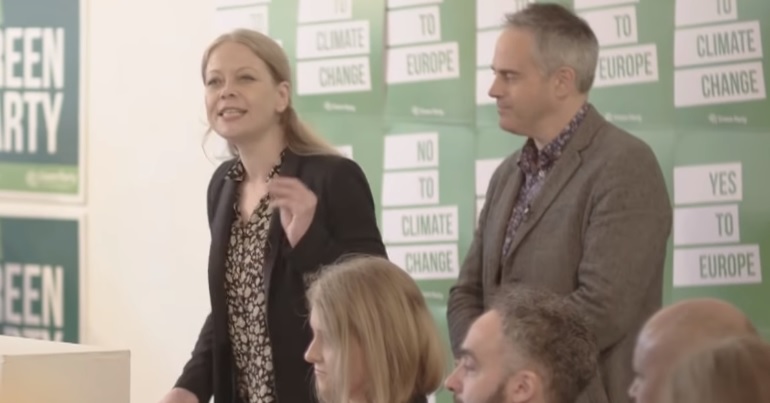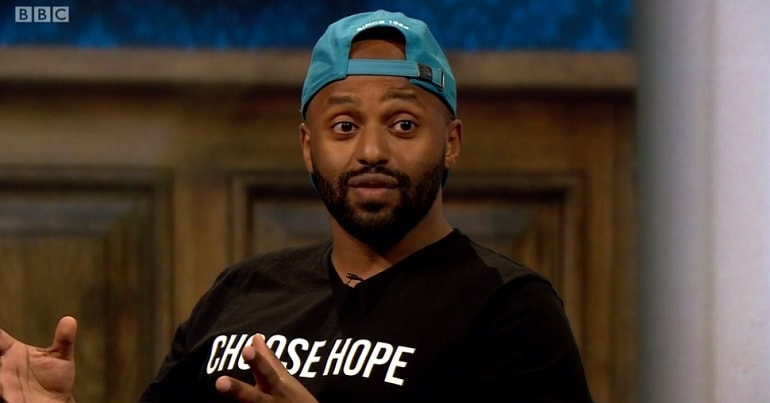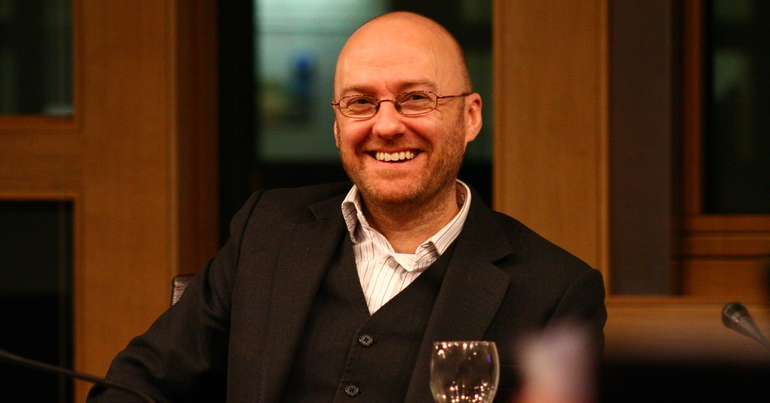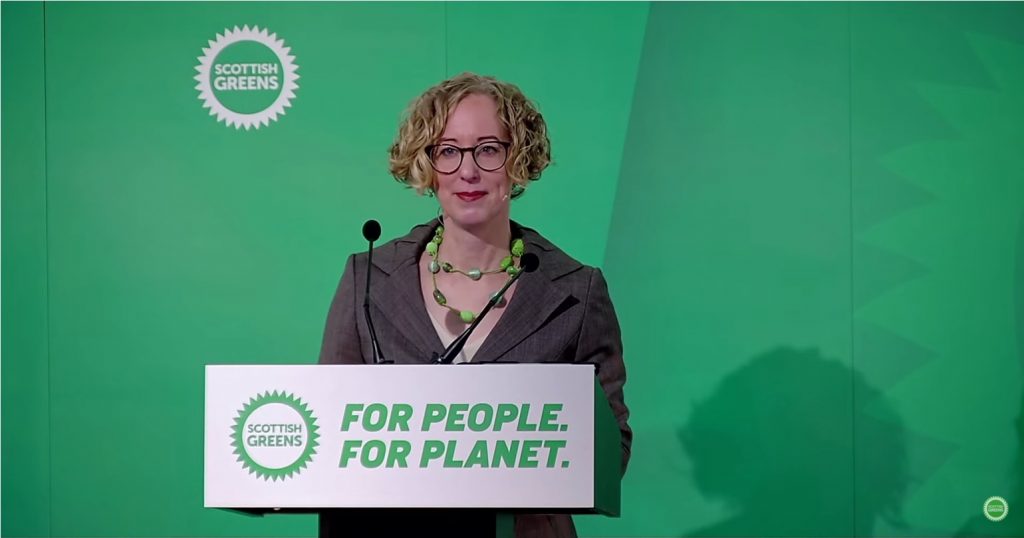Green Party leadership election underway – UK Green news round up issue 63
Content note: This article discusses transphobia in the second and third articles, domestic abuse and sexual violence in the third article, and racism in the fifth and sixth articles.
First candidates for Green Party leader and deputy leader announced

Nominations for the Green Party of England and Wales leadership election close on June 30. But already, candidates have begun to step forward for both the leadership and deputy leadership roles.
Current co-leaders Jonathan Bartley and Sian Berry fired the starting pistol on the leadership campaign this week. On June 8, the pair announced that they will be standing for re-election.
Bartley and Berry emphasised the increased electoral success the party had experienced under their leadership, telling Bright Green:
When we were elected, we did so on a platform of working with the wider party leadership team to take the Greens to the next level. Over this time the party has grown its membership by over 50 per cent. Together we have more than doubled our number of councillors, and gone from being the official opposition on five councils to playing a part in running 18 councils. And the clarity and passion of our policies and values meant we had our most successful European elections ever, electing seven MEPs last year.
Bartley and Berry have been co-leaders since 2018. Bartley previously served a co-leadership term from 2016-18 alongside Green MP Caroline Lucas.
They weren’t alone in announcing a candidacy this week. London based Green activist Nick Humberstone threw his hat in the ring to be the party’s next deputy leader. Humberstone has placed improving party communication at the heart of his campaign. Speaking to Bright Green, he said:
The purpose of language is to communicate messages. Often, I find the language we use is unhelpful in doing that, because we use words that are unnecessarily complicated. If we can say something using simple words then we should.
At the time of publication, these remain the only candidates to have come forward. While other prominent figures such as former MEPs Alex Phillips and Magid Magid have ruled themselves out of the contest, current deputy leader Amelia Womack has not yet revealed her intentions.
Voting for the leadership election will take place throughout August.
Greens condemn government u-turn on gender self-id laws

This week saw a setback for trans rights. According to reports from the Sunday Times, the government is set to abandon plans to allow legal recognition of gender based on self-identification.
Self-identification of gender is a basic demand of trans rights campaigners. It would overturn restrictive elements of the Gender Recognition Act, such as the requirement for trans people to provide evidence of having “lived in [their] acquired gender” for at least two years in order to receive a gender recognition certificate.
Among those to criticise the government’s reported change in position were prominent Greens from across the UK.
The LGBTIQA+ Greens described the news as “depressing”:
Trans people face an overly bureaucratic process for having their gender recognised.
Self ID has been successfully implemented in Ireland, Malta & Spain.
It’s so depressing that widespread scaremongering is derailing this. https://t.co/ChTOvXBlcZ
— LGBTIQA+ Greens (@LGBTIQAGreens) June 14, 2020
Co-leader of the Scottish Green Party Lorna Slater referred to the news as a “backward step”:
this backward step hurts us all. The right wants to divide the equalities movement, and we must not let that happen. Feminism needs to be intersectional, otherwise we all lose, which is why the Scottish Greens women’s network introduced a pledge of solidarity with our trans and non-binary siblings, with the support of the Rainbow Greens.
Green Party of England and Wales co-leader Sian Berry argued that Liz Truss – the minister for women and equalities – should be ashamed:
The relentlessly transphobic Sunday Times has put this story of Govt backtracking on its front page. I hope this isn’t true, but if it is then Liz Truss must look at her job title in shame. Trans rights are human rights. pic.twitter.com/1gq4cLqKJJ
— Sian Berry (@sianberry) June 14, 2020
Sian’s deputy – Amelia Womack – called the reported u-turn “disgraceful”:
If this is true, then this government is disgracefully rolling back human rights.
Sending love and solidarity to all those impacted by this front page. We’ll always campaign for Trans rights 💚 pic.twitter.com/R0LO6v1Ka6
— Amelia Womack 🏡 (@Amelia_Womack) June 14, 2020
And Young Greens of England and Wales co-chair Thomas Hazell described the reported plans as “vile”:
This is a vile article about a vile piece of news that just underlines how hard we need to continue fight in solidarity with our trans and non-binary siblings. Trans liberation or bust. https://t.co/zjKLireIwT
— Tom Hazell 🌱 #BLM (@thomashazell1) June 13, 2020
Green Party Women embroiled in transphobia allegations
The reports in the Sunday Times weren’t the only attacks on trans people and their rights in recent days. On June 6, Harry Potter author JK Rowling published a tweet mocking the use of the term “people who menstruate” in an article from US organisation Devex. The article was discussing the impact of the coronavirus pandemic on people who menstruate, including – as the article states – “girls, women, and gender non-binary persons”.
Rowling subsequently faced allegations of transphobia, and her views were implicitly or explicitly criticised by, among others, actors from the Harry Potter film series, including Emma Watson, Daniel Radcliffe and Bonnie Wright.
Rowling went on to publish a detailed blog on her website on June 10 responding to the criticism, in which she doubled down on her views and reiterated her “concerns” about the movement for trans rights. She also revealed that she is a survivor of domestic abuse and sexual assault. The Sun newspaper then ran a front page story on June 12 quoting Rowling’s abuser, which was widely condemned as misogynistic.
In the aftermath of Rowling’s tweet and blog, trans rights charity Mermaids published an open letter responding to her comments. The letter started:
We would like to begin by offering our solidarity with you as a survivor of domestic and sexual abuse. Reading your moving and honest account, we felt a connection to your pain. That connection exists between us, regardless of any differences we may have around gender identity.
It went on to state, of The Sun‘s front page:
No victim or vulnerable group should be used to sell newspapers.
Mermaids continued, by criticising Rowling’s position on trans rights. The letter read:
To address the core of your point, trans rights do not come at the expense of women’s rights. We see no evidence that trans girls are a threat to other girls in any way. Indeed, it is transgender children who often suffer horrific bullying at school and at home. And, as you will have seen, it is transgender adults who are made to feel afraid in modern British society, by those who would seek to characterise them as a threat without any evidence or justification and in the face of considerable evidence to the contrary.
On June 9, Green Party Women – the group within the Green Party of England and Wales established “to represent the needs and rights of women” within the party – shared a post (since edited) on its Facebook page which criticised abuse Rowling had received since her comments. The post also included an image of a separate tweet from Rowling which described the term “TERF” as “woman-hate”. “TERF” is an acronym for “trans exclusive radical feminist”, a phrase used by those critical of people they deem to be transphobic.
A number of Green members commented beneath the post, criticising Green Party Women for posting it.
Among those to criticise the post was Norwich Green Party councillor Nannette Youssef. She said she was “disappointed” the group had posted their support for Rowling while also condeming the abuse she had received.
Another member accused Green Party Women of “condoning transphobia” and stated that she was “reconsidering [her] loyalty to this party” as a result.
Bristol Green Society argued Green Party Women’s post “perpetuates hatred and misinformation” by “spreading Rowling’s misunderstanding of trans issues”.
Speaking to Bright Green on the issue LGBTIQA+ Greens co-chair and London Assembly candidate Benali Hamdache said:
Trans women are women. Trans men are men. Non binary identities are valid. It’s incredibly sad that anyone would use their platform to spread mistruths and misinformation. In the face of Tory attacks on Trans Rights we have to work together to protect our trans siblings.
Not all people commenting on the Green Party Women post shared the view that the group was wrong to share it, however. One person commented that those criticising Green Party Women’s post were “standing up for a misogynistic woman hating cult”. Another reiterated this view, arguing that the movement for trans rights is a “violent, abusive, misogynistic cult”. Green Party Women committee member Freda Davis echoed these comments, by describing those accusing the original post of being transphobic of being “blind to this male privilege cult”.
Green Party Women has since edited its original post on June 12 to read:
In accordance with the The Green Party code of conduct, we will be removing posts that seek to deliberately undermine the authority of the Green Party Women Committee.
Bright Green was unable to find any evidence which indicated that ‘undermining the authority’ of elected committees within the party is in violation of the Green Party’s code of conduct.
More candidates come forward for Green Party Executive elections
Although the leadership and deputy leadership elections attract the most attention, this summer will also see Green Party of England and Wales members elect other members of the Green Party Executive (GPEx). And this week, four more candidates have come forward.
On June 8, Paul Valentine and Matthew Hull announced they are standing as a job-share for the position of trade union liaison officer. Valentine has held the position since 2018, and Hull is currently the treasurer of the Young Greens of England and Wales.
The pair will be facing off against Birmingham Green Party activist Kefentse Dennis who also announced his candidacy this week.
Meanwhile, Huntingdon Green Party activist Daniel Laycock put his hat in the ring as the first candidate for the position of campaigns coordinator.
And current South West Green Party coordinator Ewan Jones has announced he will be standing for the position of GPEx chair.
In total, 11 positions on GPEx are up for election this year. The full list of positions, and the candidates so far announced are as follows:
- Leader or co-leaders – Jonathan Bartley & Sian Berry
- Deputy Leader – Nick Humberstone
- Chair – Benjamin Smith & Ashley Routh; Ewan Jones
- Campaigns Co-ordinator – Daniel Laycock
- Elections Co-ordinator – Kai Taylor & Claire Stephenson; Joe Levy and Laure Needham
- External Communications Co-ordinator – No candidates yet declared
- Management Co-ordinator – No candidates yet declared
- International Co-ordinator – Sam Murray and Alice Hubbard
- Policy Development Co-ordinator – No candidates yet declared
- Publications Co-ordinator – No candidates yet declared
- Trade Union Liaison Officer – Paul Valentine & Matthew Hull; Kefentse Dennis
Magid Magid issues 3 steps to tackling racism

In the wake of the murder of George Floyd, the Black Lives Matter movement has spread across the world with renewed vigour. Since, there has been a wider re-evaluation of societal structures and systems and how they perpetuate and reinforce racism – not least of which is the British attitude to empire and colonialism.
This week, former Green MEP Magid Magid recorded a video with BBC Yorkshire, outlining three steps he believes are key to ending systemic racism. According to Magid, these must include making:
the realities of British colonalism and imperialism a compulsory part of the school curriculum.
He continued:
The government needs to get series about tackling racial injustices, as racism is a systemic issue and therefore needs a systemic approach,
And he finished by saying:
If you’re not black, the most important thing you can do right now is to learn something about the situation. Being non-racist is not enough, we all have to be anti-racists.
You can watch the full video here:
“Being non-racist is not enough, we all have to be anti-racists.”
Former Lord Mayor of Sheffield Magid Magid outlines the three steps he believes can begin to tackle “systemic racism”.https://t.co/DzTYtbm1VN pic.twitter.com/V4QpsU7tZn
— BBC Yorkshire (@BBCLookNorth) June 12, 2020
Scottish Greens celebrate Scottish Parliament supporting ban on exports to the USA of police weapons

This week, the Scottish Parliament agreed to proposals put forward by the Scottish Greens which called on the UK government to ban exports to the USA of police weaponry – such as tear gas and riot shields – to the USA. The motion came in the wake of the murder of George Floyd.
Patrick Harvie – co-leader of the Scottish Green Party – said:
This is a significant moment, and shows a genuine recognition of the role Scotland has in acknowledging that Black Lives Matter, both on the streets of American cities and in the recognition of our colonial past.
The Scottish Parliament has given a clear message to the UK Government tonight. We cannot in good conscience supply tear gas and rubber bullets to police forces involved in the systematic targeting of black people and antiracism protesters. Those exports need to end.
UK Greens celebrate motions passed at European Green Party council
The European Green Party (EGP) council – one of the key decision making bodies of the pan-European federation of Green Parties – took place online from 10-13 June.
The EGP council passed a series of resolutions, including one expressing solidarity with the Black Lives Matter movement, and committing to a number of campaigns for racial justice. This motion was supported by – among other parties – the Green Party of England and Wales and the Federation of Young European Greens.
Alongside this, the EGP council also passed a resolution supporting gig economy workers. The resolution called on the European Union and national governments to support the right to collective bargaining and a living wage for gig economy workers.
Speaking on the passing of these motions, Green Party of England and Wales international committee member Sam Murray told Bright Green:
European Greens once again are speaking truth to power voting for resolutions to support Black Lives Matter, gig workers and on taking steps for a green coronavirus recovery. Secretary General Mar Garcia Sanz put it best, when in her closing speech she called for a new globalism of care and solidarity we can rebuild as we come out of this difficult time.
Also at the council, former Green Party of England and Wales treasurer Emma Carter was elected to the EGP financial advisory board. On her election, Carter told Bright Green:
It is an honour to have been elected by the council to serve on the Finance Advisory Board. I’m really looking forward to working with new colleagues and making stronger links with our sister parties across Europe. Having worked at an executive level in the Green Party of England and Wales I’m now excited by this next chapter, and by what the EGP will achieve over the next two and a half years.
PS. We hope you enjoyed this article. Bright Green has got big plans for the future to publish many more articles like this. You can help make that happen. Please donate to Bright Green now.




Leave a Reply